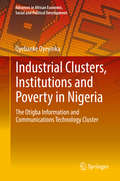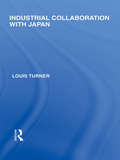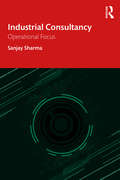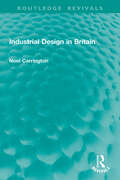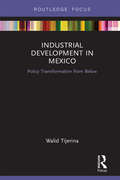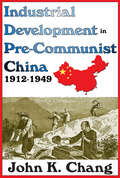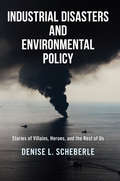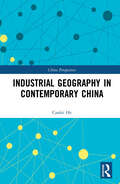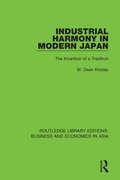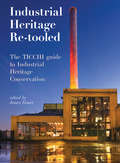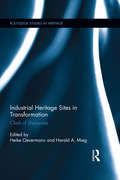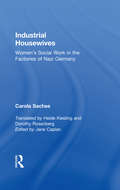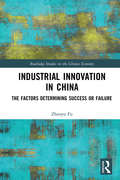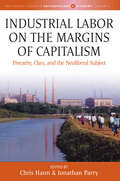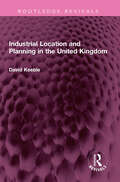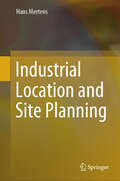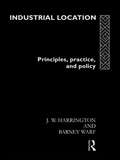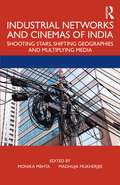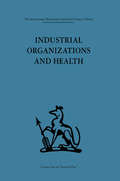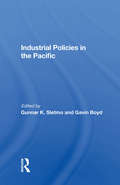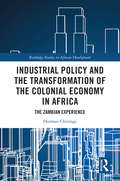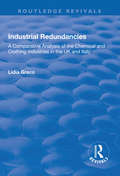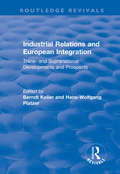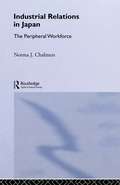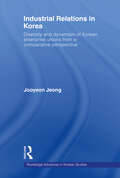- Table View
- List View
Industrial Clusters, Institutions and Poverty in Nigeria
by Oyebanke OyeyinkaThis book provides a systematic examination of the relationship between industrial clusters and poverty, which is analyzed using a multidimensional framework. It examines the often-neglected concept of social protection as a means of mitigating the risks and vulnerabilities faced by workers and citizens in poor countries. By analyzing the case of the Otigba Information and Communications Technology cluster in Lagos, Nigeria, the author shows under which conditions firms in productive clusters can pass on benefits to workers in ways that improve their living standards in the wider socio-economic and spatial context of the region. The results presented provide substantial evidence of opportunities for economic development, helping planners to explore different avenues for integrating firm-driven social protection into social policy.
Industrial Collaboration with Japan (Routledge Library Editions: Japan)
by Louis TurnerThis study looks at the experiences of European and American companies that have collaborated with their Japanese competitors in the fields of computers, consumer electronics, automobiles and aero-engines, by forming joint ventures, designing products together and pursuing complementary marketing strategies. It examines why these companies have chosen to collaborate rather than compete; whether the Japanese companies have proved to be reliable partners; whether the non-Japanese have been left behind; and what the future of such collaboration may be. The book concludes by pointing to a growing interest among non-Japanese companies in investing and collaborating within Japan itself.
Industrial Consultancy: Operational Focus
by Sanjay SharmaThis book provides an in-depth analysis of industrial consultancy on a variety of issues and aspects including operations and services. This book: Looks at both individual-level consultancy and consultancy for firms, companies, or institutions. Uses observations, examples, and case studies to bring together key themes: consulting approach; production operations vs. services consulting; location and facilities criteria; human–machine interaction; lead time objective; outsourcing decisions and management; and infrastructure influence along with consultancy objectives, strategic considerations, and conflict resolution. Presents a comprehensive understanding of industrial consultancy and services offered to a wide range of industries, across type, size, and scale, including manufacturing, pharmaceutical, fabrication, and transformer industries. The first of its kind, this book will be a useful resource for industry and management professionals as well as scholars and researchers of business management, business economics, operations, entrepreneurship and organizational behaviour, and engineering.
Industrial Design in Britain (Routledge Revivals)
by Noel CarringtonIndustrial Design in Britain (1976) describes the industrial design movement in Britain from its origins, when it broke away from the Arts and Crafts in 1915, until 1945 when its vital importance to industry was officially recognised, and the Council of Industrial Design was established with a grant from the Government.
Industrial Development in Mexico: Policy Transformation from Below (Routledge Studies in Latin American Development)
by Walid TijerinaThis book explores developmental policymaking across the multiple levels of Mexico’s contemporary state, arguing that many of the innovations in industrial policy have been driven at the subnational level. In the three decades since Mexico’s neoliberal turn in its political economy, subnational units of government have taken a lead in industrial transformation, galvanising policy from below. With most literature on new developmentalism focusing on the national level, this book is an important exploration of the differentiated and rewarding results that may be found below the state’s centre. Based on an original dataset of written and oral interviews gained from national and subnational governmental units of industrial policymaking in Mexico, the book shows how attribution and power are diffused across the contemporary state’s multiple levels. Notable subnational projects explored by the book include public-private collaboration, productive investments and an interesting array of incentives targeted towards industrial upgrading and innovation. The book concludes by providing a distinctive and systematic comparison between subnational units from different countries in Latin America and further afield, in order to assess the commonalities of developmental roles and policies. Industrial Development in Mexico will be an important read for scholars across the fields of political science, political economy and Latin American development.
Industrial Development in Pre-Communist China: 1912-1949
by John K. ChangThe Chinese economy has been the subject of substantial research in recent years in the United States and abroad. Much has been made of significant strides toward industrial development since the Communist takeover. But it is impossible to understand what has been achieved unless one measures these gains against economic events in the pre-Communist period. This book offers a record of China's industrialization, with its comprehensive statistical analysis of the industrial growth of pre-Communist China.Industrial Development in Pre-Communist China covers the period from 1912 to 1949 and deals with all of China irrespective of changes in political boundaries. For purposes of this study, ""industrial production"" includes mining, metallurgy, manufacturing, and fuel and power; the construction industry is not included. Chang finds that the average annual rate of growth of the modern industrial sector during the pre-World War I period was about 8 or 9 percent, including Manchuria. During the period from 1928 to 1936, under the Nanking Government, political unification was achieved. Peace and order were maintained and the necessary foundations for economic transformation in the post-World War II period were established.At the time of its original publication in 1969, Chang's work represented an important first step toward a comprehensive, quantitative study of the history of China's industrialization and a benchmark against which the Communist achievement can be measured, this work forces reconsideration of widely held views on China's economic and industrial development. An important reference for the study of Chinese history and economics, especially for the Republican period, Chang's work is of continuing value to all Sinologists and to specialists in economic development and economic history.
Industrial Disasters and Environmental Policy: Stories of Villains, Heroes, and the Rest of Us
by Denise L. ScheberleEnvironmental stories have all the elements of a good drama—villains that plunge the world into danger and heroes that fight for positive change. Industrial Disasters and Environmental Policy: Stories of Villains, Heroes, and the Rest of Us illuminates the interplay between environmental policies and the people and groups who influence their development and implementation. Through the stories of four major industrial disasters—the Union Carbide plant explosion, the BP oil spill, the Upper Big Branch Mine explosion, and the asbestos poisoning in Libby, Montana—this book examines the organizational breakdowns and regulatory lapses that caused these disasters, and how attitudes and policies changed as a result. It also explores the achievements of environmental heroes like Gaylord Nelson and Judy Bonds and how their activism has shaped US environmental politics and policies. Industrial Disasters and Environmental Policy concludes with a discussion of how the "rest of us" can participate in everyday environmental actions, hold corporations and the government accountable, and lobby for greater environmental protections. With its compelling stories and calls to action, this book helps students understand how US environmental policies have developed and transformed—and how they can continue to do so.
Industrial Geography in Contemporary China (China Perspectives)
by Canfei HeThis title provides an overall view of industrial geography in the context of contemporary China and investigates the development processes, research paradigms, and achievements of China’s industrial geography, with a particular focus on the post- reform period. The first two chapters introduce the overall background of industrialization and evolving policies of industrial geography in contemporary China. Based on sweeping literature reviews, empirical data analysis, and case studies, the author then examines key aspects of industrial geography and geographical patterns, dynamics, and the impact of industrial development. The following topics are discussed in detail: the geographical distribution and agglomeration of industries; national industrial parks; urbanization and industrialization; regional evolution of industries and interregional networks; firms and industrial organizations; exports, foreign investment, and trade; labour migration; land supply; industrial innovation; environmental issues and regulations; and industrial planning. In providing a full picture of the industrial geography of contemporary China, the title will be an essential reference for scholars and students studying economic geography, industrial geography, and the industrial and economic development of the People’s Republic of China.
Industrial Harmony in Modern Japan: The Invention of a Tradition (Routledge Library Editions: Business and Economics in Asia #17)
by W. Dean KinzleyEconomic success in Japan has been attributed to the existence of harmonious labour-management relations. This book, first published in 1991, argues that this unique ‘culture of harmony’ was consciously invented and developed over the last century. A semi-bureaucratic organization called the Kyochokai was established in 1919 to meet the needs of an emerging industrial society. It took the lead in trying to define the values which would be suitable for a new Japanese-style industrial culture. The resulting ‘invented’ tradition has played an important role in the evolution and character of Japanese economic values and behaviour.
Industrial Heritage Re-tooled: The TICCIH Guide to Industrial Heritage Conservation
by James DouetThis volume comprises the authoritative work from the International Committee for the Conservation of the Industrial Heritage – the international group dedicated to industrial archaeology and heritage – detailing the latest approaches to the conservation of the global industrial heritage. With contributions from over thirty specialists in archaeology and industrial heritage, Industrial Heritage Re-tooled establishes the first set of comprehensive best practices for the management, conservation, and interpretation of historical industrial sites. This book:-defines the meaning and scope of industrial heritage within an international context;-addresses the identification and conservation of the material remains of industry;-covers subjects as diverse as documentation and recording of industrial heritage, industrial tourism, and the teaching of industrial heritage in museums, schools, and universities.
Industrial Heritage Sites in Transformation: Clash of Discourses (Routledge Studies In Heritage Ser.)
by Harald A. Mieg Heike OevermannThe management of industrial heritage sites requires rethinking in the context of urban change, and the issue of how to balance protection, preservation/conservation, and development becomes all the more crucial as industrial heritage sites grow in number. This brings into play new challenges—not only through the known conflicts between monument preservation and contemporary architecture, but also with the increasing demand for economic urban development by reusing the built heritage of former industrial sites. This book explores the conservation and change of industrial heritage sites in transformation, presenting and examining ten European and Asian case studies. The interdisciplinary approach of the book connects a diversity of rationales and discourses, including monument protection, World Heritage conventions, urban regeneration, urban planning and design, architecture, and politics. This is the first book to deepen the understanding of industrial heritage site management as a networked, multi-dimensional task involving diverse social agents and societal discourses.
Industrial Housewives: Women's Social Work in the Factories of Nazi Germany
by Carola SachseFocusing on women and their work, this valuable historical study traces industrial social work from its inception through the Nazi period. Author Sachse provides an analysis of policies applied to women workers rather than developed by and for them--as an example of how social policy treats women. This thorough book examines the continuities and discontinuities of industrial social work, and assesses the effect on the industrial welfare system of developments within National Socialism. Within this framework the study examines the role of women in industrial social work and labor relations, the attitudes of various groups toward the proper relations between industry and government, and the well-documented relationship between industrialists and the German Labor Front (DAF), the organization that replaced the outlawed labor unions.
Industrial Innovation in China: The Factors Determining Success or Failure (Routledge Studies on the Chinese Economy)
by Zhenyu FuThis book, based on extensive original research, examines the factors which lead to successful innovation in Chinese industry. Considering the large and important Chinese mining industry in detail, it argues that innovation is key for success in all industries, not just new "tech" industries. It reveals how the interaction of universities, governments and industries is highly significant, considers how some parts of the industry, such as the mining and mineral processing stages, are more innovative than other stages, such as prospecting and mining equipment manufacturing, and suggests that this is explained both by the distance between final products and the market and commercialisation, and by the intensity of the interaction between the industrial company and the university or research institute. Throughout, the book includes examples and case studies to highlight the points made.
Industrial Labor on the Margins of Capitalism: Precarity, Class, and the Neoliberal Subject (Max Planck Studies in Anthropology and Economy #4)
by Jonathan Parry Chris HannBringing together ethnographic case studies of industrial labor from different parts of the world, Industrial Labor on the Margins of Capitalism explores the increasing casualization of workforces and the weakening power of organized labor. This division owes much to state policies and is reflected in local understandings of class. By exploring this relationship, these essays question the claim that neoliberal ideology has become the new ‘commonsense’ of our times and suggest various propositions about the conditions that create employment regimes based on flexible labor.
Industrial Location and Planning in the United Kingdom (Routledge Revivals)
by David KeebleFirst published in 1976, Industrial Location and Planning in the United Kingdom investigates in detail the nature of the changes taking place in the location of manufacturing industry since the 1950s and the reasons for them, including the effects of government regional policy and of factors such as market accessibility, labour availability and cost, transport facilities and personal residential preferences by industrialists and workers. The book brings together a wide range of published and unpublished material in discussing and evaluating explanations for regional and local manufacturing growth or decline. Government regional policy and planning is singled out for special attention, in terms of the impact of Development Area grants, of local planning controls, and of the town programmes. Manufacturing movement to new locations and the implications of government regional policies for industrial efficiency are examined in detail, together with the reasons for locational change in key but controversial industries such as steel, motor vehicles and electronics. This book will be of interest to students of urban planning, manufacturing, and development as well as city planners.
Industrial Location and Site Planning
by Hans MertensThis book looks at the complexity of the topic of industrial site planning. Levels and actors are understood and discussed in terms of their mutual interaction. There is no stable “end state” in any industrial sector. At best, these are states of balance in motion. The aim is therefore, to show paths and phases of development that help to overcome stagnation thresholds and to explore the triggering moments for (new) dynamics. Technological justifications (such as AI, Industry 4.0, decarbonization) are only one dimension. Industrial policy, cooperation models – inter-communal for example in the case between market participants and producers, as well as integrative planning activities, both have socio-economic and ecological dimensions.Based on various regional examples from central Germany (and certain international comparisons) this volume helps illustrate industrial location developments in the context of ongoing regional structural changes. The author's (architect andmember of relevant specialist organizations, MBA in Switzerland and the USA) involvement with a wide variety of projects (monuments, university and industrial buildings, residential construction, etc.) over almost 40 years is based on design and construction practice. Furthermore, 7 technical experts have reflected on the diverse dimension of the subject presented in this volume. Additionally, deindustrialization scenarios are contrasted with the necessity and path to neo-industrialization.
Industrial Location: Principles, Practice and Policy
by Barney Warf James W. HarringtonLocation is vital to the efficiency and profitability of industrial activity. Industrial Location presents a comprehensive introduction to and critical review of this field of growing academic and business interest. In business, the right choices have to be made to produce profit. Industrial location is a fixed investment, crucial to the strategy and capital investment of any organization. Location also impacts upon non-investors, directly affecting employment, the environment, and economic activity in the locale. Focusing chiefly on the United States, but drawing on an international range of cases, the authors explain the economic, social and political forces which have shaped comtemporary patterns of industrialization and examines the changing nature of production and systems.
Industrial Networks and Cinemas of India: Shooting Stars, Shifting Geographies and Multiplying Media
by Monika Mehta Madhuja MukherjeeThis volume points to the limits of models such as regional, national, and transnational, and develops ‘network’ as a conceptual category to study cinemas of India. Through grounded and interdisciplinary research, it shows how film industries located in disparate territories have not functioned as isolated units and draws attention to the industrial traffic – of filmic material, actors, performers, authors, technicians, genres, styles, sounds, expertise, languages, and capital, across trans-regional contexts -- since the inception of cinema. It excavates histories of film production, distribution and exhibition, and their connections beyond regional and national boundaries, and between places, industrial practices, and multiple media. The chapters in this volume address a range of themes such as transgressive female figures; networks of authors and technicians; trans-regional production links and changing technologies, and new media geographies. By tracking manifold changes in the contexts of transforming media, and inter-connections between diverse industrial nodal points, this book expands the critical vocabulary in media and production studies and foregrounds new methods for examining cinema. A generative account of industrial networks, this volume will be useful for scholars and researchers of film studies, cinema studies, media studies, production studies, media sociology, gender studies, South Asian studies, and cultural studies.
Industrial Organizations and Health
by Frank Baker Alan Sheldon Peter J. M. McEwanTavistock Press was established as a co-operative venture between the Tavistock Institute and Routledge & Kegan Paul (RKP) in the 1950s to produce a series of major contributions across the social sciences. This volume is part of a 2001 reissue of a selection of those important works which have since gone out of print, or are difficult to locate. Published by Routledge, 112 volumes in total are being brought together under the name The International Behavioural and Social Sciences Library: Classics from the Tavistock Press. Reproduced here in facsimile, this volume was originally published in 1969 and is available individually. The collection is also available in a number of themed mini-sets of between 5 and 13 volumes, or as a complete collection.
Industrial Policies In The Pacific
by Gunnar K. Sletmo Gavin BoydIn GATT negotiations over the past several years the United States, a founding member of the Asia Pacific Economic Cooperation Forum, has been pushing hard for a global liberalization of trade in services. This development would have special significance for the Pacific because of the intensifying competition between the United States and Japan for market shares. A comprehensive analysis of the service sector's role in that dynamic region is offered in this timely volume. Leading experts explore how service enterprises have affected trade in goods and transnational manufacturing, forming a regional pattern of interdependence. The authors assess each service sector from a regional perspective and offer detailed individual country studies as well. The concluding chapters provide a broad overview of corporate strategies, discuss questions of regional cooperation, and identify opportunities for new regional service enterprises.
Industrial Policy and the Transformation of the Colonial Economy in Africa: The Zambian Experience (Routledge Studies in African Development)
by Horman ChitongeIndustrial Policy and the Transformation of the Colonial Economy in Africa offers an in-depth analysis of the role industrial policy can play in the transformation of African economies. Using examples from Zambia’s industrial development experience, this book illustrates that core features of the colonial economy have not just survived six decades of independence in most African countries, but they have continued to shape the nature, scope and pace of economic activities on the continent. The book argues that since the colonial economy in Africa was not intended to serve the interests of Africans, it is imperative that the structures and the underlying rationale of the colonial economy are radically reoriented if economic activities in Africa are to benefit the majority of Africans. Drawing from the Zambian experience, the book shows that the transformation of the colonial economy in Africa is urgently needed. Whilst this has proved to be difficult over the past six decades, it can be done. The book outlines a specific type of industrial policy, Frontier Industrial Policy, as a key instrument for transforming the structure of African economies. At a time when economic growth across Africa is under considerable pressure due to COVID-19, the insights in this book will be of interest to researchers across Economics, Development, Postcolonial Studies, and African Studies.
Industrial Redundancies: A Comparative Analysis of the Chemical and Clothing Industries in the UK and Italy (Routledge Revivals)
by Lidia GrecoThis title was first published in 2002. This work explores processes of corporate restructuring and employment change in two industrial areas, Teeside (in the north-east of England) and Brindisi (in the south-east of Italy), by drawing upon evidence from two industries - the chemical and clothing sectors.
Industrial Relations and European Integration: Trans and Supranational Developments and Prospects (Routledge Revivals Ser.)
by Hans-wolfgang Platzer Berndt KellerThis title was first published in 2003.The completion of the Single Market and the launching of the European Monetary Union during the 1990s have been accompanied by processes of socio-economic restructuring and major changes in the structure and forms of governance within the dynamic multi-level EU system. The patterns of reaction and adaptation of national industrial relations systems to these EU - developments are discussed under the heading of "Europeanisation" of national IR-systems. The Maastricht and Amsterdam Treaties have extended - to a certain degree - the scope for legislative and coordinated activities by the EU in the fields of social, labour - market and employment policies. These basic legal and political decisions have created new avenues for the development of transnational industrial relations and the establishment of new arenas for EU - level interaction, including social dialogues between the social partners. .
Industrial Relations in Japan: The Peripheral Sector (Nissan Institute/Routledge Japanese Studies)
by Norma ChalmersThe conventional picture of industry and industrial relations in Japan is of a number of very large firms providing extremely attractive working conditions for their happy and contented workforce. Norma Chalmers shows that there is in fact another, very different side to the picture, which occurs in the the peripheral sector. Here, conditions are often poor, wages very low and continuity of employment virtually non-existent. There are many small firms where the effectiveness of worker organisation and bargaining declines as the firm's size and proximity to the industrial centre decrease. Moreover, as Chalmers shows, the peripheral sector is very large, and the conventional picture of the model workforce should probably be confined to a few flagship companies. The book argues that the model nature of the large firms may stem in part from the fact that they are able to off-load problems onto smaller firms who produce the components necessary for the large firm sector at disadvantageous subcontract terms.
Industrial Relations in Korea: Diversity and Dynamism of Korean Enterprise Unions from a Comparative Perspective (Routledge Advances in Korean Studies)
by Jooyeon JeongA key factor in Korea's economic success is the nature of industrial relations in Korean business and industry. Joo-Yeon Jeong presents a comprehensive survey of the current state of industrial relations in Korea. He shows how union membership has changed over recent decades, and how the focus of bargaining has widened from purely financial considerations to include a much wider range of issues including, principally, issues related to job security. In addition, the book considers the role of government in shaping the legal and institutional environment, and of employers, who have taken a more aggressive role towards unions since the mid-1990s.
